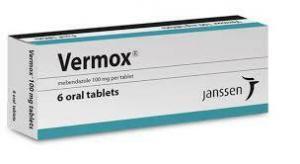Vermox (Mebendazole)

Dosages
Vermox 100 mg
| Quantity | Price per pill | Total price | |
|---|---|---|---|
| 90 | $0.50 | $45.00 | |
| 120 | $0.46 | $55.00 | |
| 180 | $0.42 | $75.00 | |
| 270 | $0.39 | $105.00 | |
| 360 | $0.38 | $136.00 |
Payment & Shipping
Your order is carefully packed and ships within 24 hours. Here's the typical package.
Sized like a regular personal letter (9.4x4.3x0.3 inches), with no indication of its contents.



| Shipping Method | Estimated delivery |
|---|---|
| Express Free for orders over $300.00 | Estimated delivery to the U.S.: 4-7 days |
| Standard Free for orders over $200.00 | Estimated delivery to the U.S.: 14-21 days |









Discount Coupons
- Independence Day - July 4, 2025 10% JULY410
- Labor Day - September 1, 2025 7% LABOR07
- Thanksgiving - November 27, 2025 9% THANKS09
Brand Names
| Country | Brand Names |
|---|---|
 Argentina Argentina | Dazomet Helmint Mebutar Nemasole Tesical |
 Australia Australia | Chemists Own De Worm Sqworm |
 Belgium Belgium | Docmebenda |
 Brazil Brazil | Ascariobel Ascaritor Ascarobex Athelmin Averpan Belmirax Bendrax Bivalem Certovermil Cessaverm Crisdazol Divermil Ductelmin Eraverm Feller Geophagol Gran-Verm Helmizil Ibdazol Kindelmin Meben Mebendazotil Mebendil Mebental Mebiozol Medazol Menbel Moben Multielmin Multizol Necamin Neo Mebend Novelmin Panfugan Pantelmin Panverm Paraverm Parelmin Pentazole Pluriverm Plurivermil Polidazol Politelmin Probendazol Quintelmin Sifbem Sirben Tetrahelmin Trotil Vermepen Vermiben Verminon Vermirax Vermonon Vermoplex Vermoral Verzol Zol-Triq Zoldaben |
 Germany Germany | Surfont |
 Greece Greece | Cecurin Septinalis |
 Malaysia Malaysia | Quemox Thelmox |
 Mexico Mexico | Amatol Amycil Benedaxol Bensolmin Bestelar Carbatil Daben Diazolen Edivertin Exaverm Exbenzol Exteny Fanciadazol Hedazol Helminzole L-Ombrix Lumbicid M-Bentabs Marben Meb-Overoid Meban Mebandozer Mebelmin Mebendicin Mebensole Mebentiasis Mebentine Mebentral Mizolmex Nemapres Oxizole Panvermin Paranzol Prodazol Profenzol Revapol Soltric Vermicol Vermidil Vermin-Dazol Vertex Vertizole |
 Netherlands Netherlands | Anti-Worm Kruidvat Anti-worm Madicure Trekpleister Anti-Worm |
 New Zealand New Zealand | Combantrin-1 Mindol |
 Portugal Portugal | Pantelmin Toloxim |
 Spain Spain | Bantenol Lomper Mebendan Oxitover Sufil Sulfil |
 Turkey Turkey | Vermazol Versid |
| Manufacturer | Brand Names |
|---|---|
| Cipla Limited | Mebex |
FAQ
Description
Treating worm infections is crucial because these infections can cause significant health problems, especially in vulnerable populations such as children, older people, and individuals with weakened immune systems. Effective treatment not only alleviates symptoms and prevents the long-term consequences of these infections but also reduces the risk of transmission to others, helping to protect public health and maintain a healthy community environment. Early and appropriate treatment prevents these complications and ensures overall well-being.

What Is Vermox?
Vermox is the brand name for Mebendazole, a medication used to treat parasitic worm infections such as pinworm, roundworm, whipworm, and hookworm. It works by preventing worms from absorbing sugars, essential for their survival, leading to their death and eventual elimination from the body.
Ingredients
Vermox contains the active ingredient Mebendazole. The inactive ingredients include maize starch, lactose, sodium lauryl sulfate, magnesium stearate, talc, and sodium starch glycolate.
Mebendazole is an antiparasitic medication used to treat various intestinal worm infections, including pinworm, roundworm, whipworm, and hookworm. It works by inhibiting the worms' ability to absorb glucose, which depletes their energy stores and eventually leads to their death. Mebendazole is generally well-tolerated and is often administered as a single dose or over a few days, depending on the type and severity of the infection.
It is available in both tablet and chewable forms. Due to its effectiveness and broad spectrum of activity, Mebendazole is widely used in both individual and public health settings to control parasitic infections.
Uses of Vermox
Vermox is effective against a range of parasitic infections, including pinworm (enterobiasis), roundworm (ascariasis), hookworm (ancylostomiasis or necatoriasis), whipworm (trichuriasis), and mixed infections involving multiple types of worms.
What Are the Dosages of Vermox?
| Condition | Dosage (Adults and Children over 2 years) |
|---|---|
| Pinworm | 100 mg as a single dose |
| Roundworm, Whipworm, Hookworm, and Mixed Infections | 100 mg twice daily for 3 days |
Dosage may vary based on age, weight, and severity of infection. Always follow the prescription provided by a healthcare professional.
Important Safety Information
Vermox should be used under medical supervision. It should not be used by anyone allergic to Mebendazole or any of its ingredients.
Mebendazole is generally not recommended for children under 2 years of age due to the risk of severe side effects, such as convulsions. For children over 2, it should only be used under a healthcare provider's supervision. The dosage for children is often adjusted based on their age, weight, and type of infection.
Children taking Mebendazole should be monitored for adverse effects such as stomach pain, diarrhea, or changes in behavior. Parents or caregivers should immediately report any severe side effects, such as rash, difficulty breathing, or unusual tiredness.
Mebendazole is available in tablet and chewable forms. It is essential to ensure the child can properly swallow or chew the medication to avoid choking hazards.
Elderly patients may be more sensitive to the effects of Mebendazole due to age-related changes in liver and kidney function, which can affect how the medication is processed and eliminated from the body. Lower doses or close monitoring may be necessary to prevent adverse effects.
Elderly individuals often take multiple medications, increasing the risk of potential drug interactions with Mebendazole. Medications like cimetidine, used to treat stomach ulcers or reflux, can increase the levels of Mebendazole in the blood, potentially leading to toxicity. A healthcare provider should carefully review all medications to assess for possible interactions.
Since Mebendazole can cause liver dysfunction, elderly patients, particularly those with a history of liver disease, should have their liver function monitored regularly while on the medication.
It is important to note that Mebendazole is not recommended for use during pregnancy, especially in the first trimester, due to potential harm to the fetus. Its use in breastfeeding women should also be approached with caution.
Prescription
Vermox is a prescription medication and should be taken exactly as directed by a healthcare professional. Even if symptoms improve, completing the full course of treatment is essential to prevent reinfection or resistance.
Contraindications
This medication should not be used by individuals with known hypersensitivity to Mebendazole or its components, pregnant women, particularly in the early stages, and those with severe liver disease.

Side Effects
The following table provides an overview of the side effects associated with Mebendazole, along with their descriptions and management strategies.
| Category | Side Effect | Description | Management |
|---|---|---|---|
| Common Side Effects | Gastrointestinal Issues | Abdominal pain, diarrhea, nausea, and flatulence (gas). | Usually mild; symptoms often resolve on their own. |
| Headache | Mild to moderate headaches. | Over-the-counter pain relievers (e.g., acetaminophen) may help. | |
| Dizziness | Feeling light-headed or dizzy, especially in the initial days of treatment. | Avoid sudden movements; sit or lie down if feeling dizzy. | |
| Less Common Side Effects | Fever | Mild fever, especially if there is a large worm burden. | Monitor; may resolve as the body eliminates the worms. |
| Skin Rash or Itching | Mild skin reactions such as rashes or itching. | Typically temporary; antihistamines or topical creams may help. | |
| Rare but Serious Side Effects | Allergic Reactions (Anaphylaxis) | Difficulty breathing, swelling of the face, lips, tongue, or throat, severe rash, or hives. | Requires immediate medical attention; may need emergency treatment (e.g., epinephrine). |
| Seizures | Convulsions, particularly in young children or those with pre-existing neurological conditions. | Discontinue use and seek immediate medical help. | |
| Liver Function Abnormalities | Elevated liver enzymes, jaundice, dark urine, fatigue, upper abdominal pain. | Regularly monitor liver function; discontinue use and consult a healthcare provider if symptoms appear. | |
| Bone Marrow Suppression | Decreased white or red blood cells, leading to unusual bleeding, bruising, persistent sore throat. | Requires immediate medical evaluation; may need blood tests and possibly hospitalization. | |
| Side Effects Specific to Long-Term Use | Alopecia | Hair loss or thinning. | Usually resolves after discontinuing the medication; consult a healthcare provider if concerned. |
| Hepatitis | Inflammation of the liver with symptoms such as flu-like signs, jaundice, and abdominal pain. | Discontinue use and seek medical attention; may require specific treatment. | |
| Severe Skin Reactions | Stevens-Johnson syndrome or toxic epidermal necrolysis (widespread rash, blisters, peeling skin). | Immediate discontinuation and urgent medical care; hospitalization may be necessary. |
Interactions
Vermox may interact with certain medications, such as cimetidine, which can increase Mebendazole levels, and metronidazole, which may heighten the risk of side effects. Alcohol should also be avoided during treatment to minimize the risk of liver toxicity.
Overdose
An overdose of Vermox may present with symptoms like severe abdominal pain, nausea, vomiting, diarrhea, drowsiness, and in rare cases, seizures. Immediate medical attention is required in such situations. Gastric lavage or the administration of activated charcoal may be considered in severe cases.
Storage
Vermox should be stored at room temperature, between 20-25°C (68-77°F). It should be kept in its original container, tightly closed, and away from light and moisture. Ensure that the medication is stored out of reach of children.
Vermox is highly effective in treating a broad range of intestinal worm infections with minimal side effects in most cases. Its convenient dosing schedule makes it easy to use, often requiring only a single dose or a short course of treatment. Additionally, it helps prevent the spread of parasitic infections within communities.
You may find more information about this drug here.

















